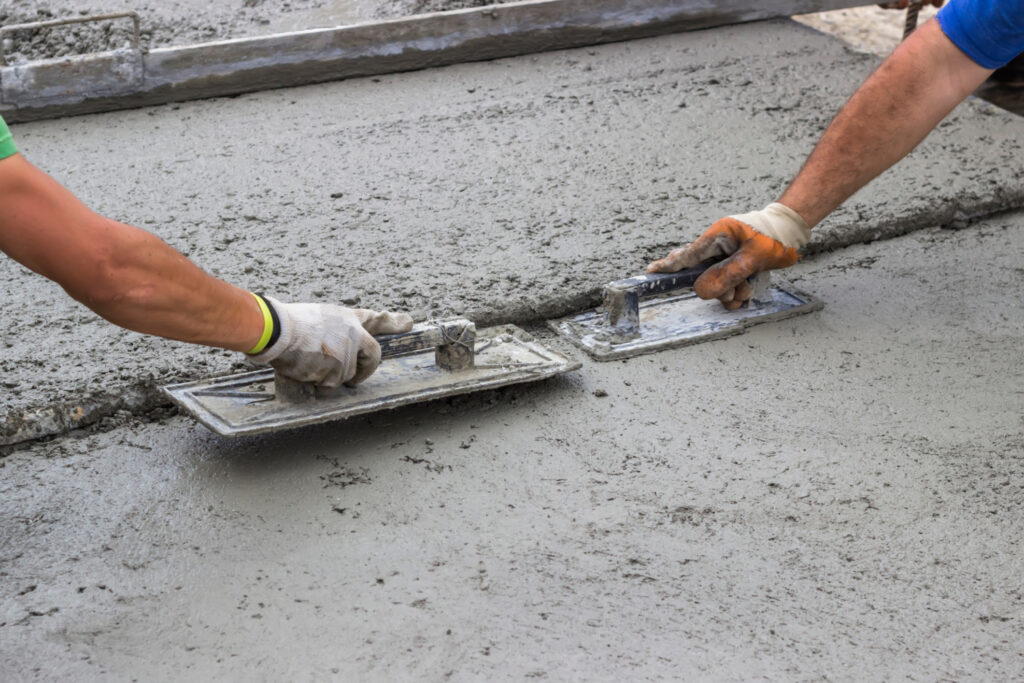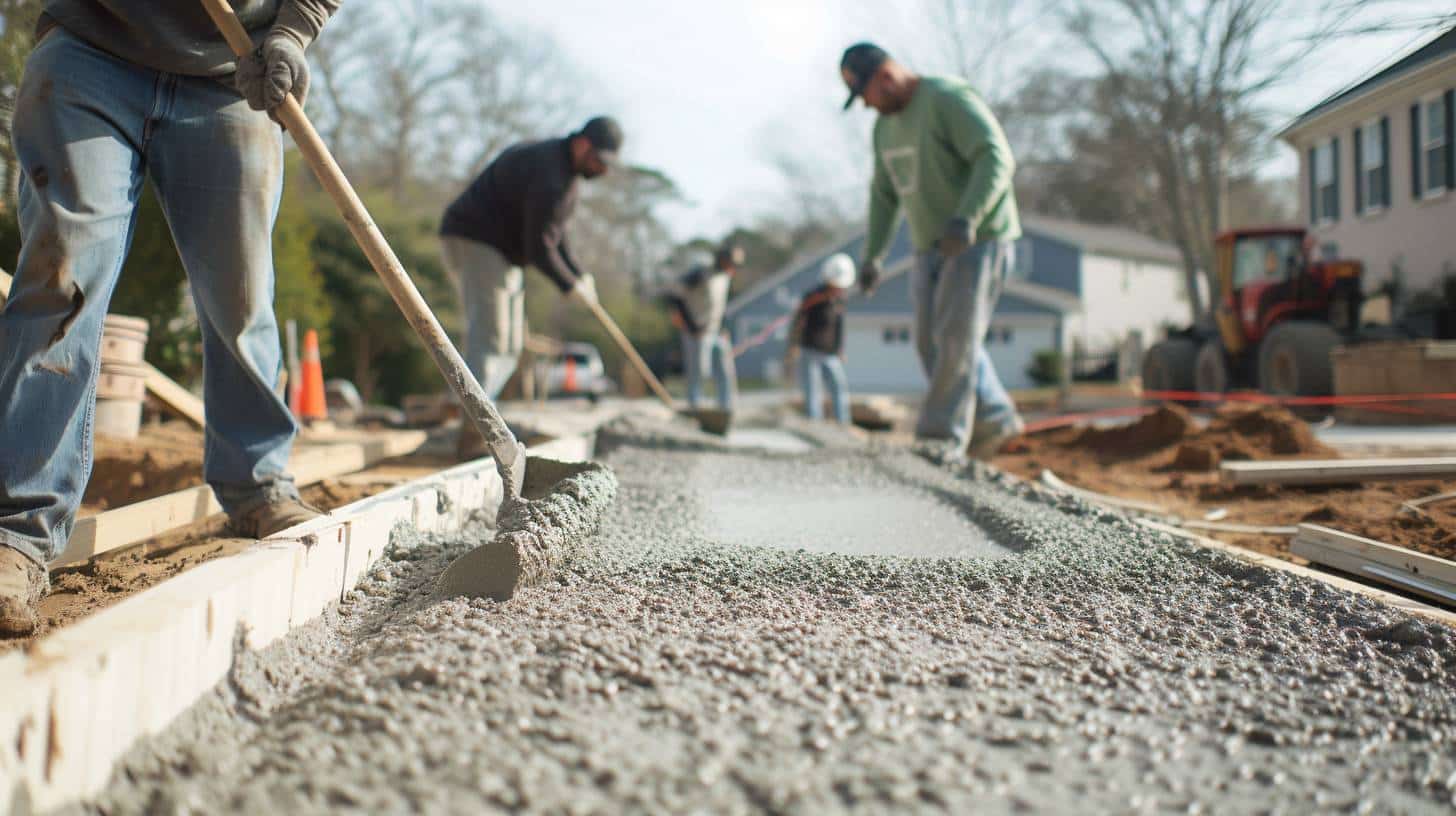
Recognizing the Vital Role of a Concrete Professional in Modern Building And Construction and Style
Concrete specialists are necessary to the building and style sectors. Their knowledge assurances that structures are not only resilient however likewise aesthetically pleasing. They take part in different responsibilities, from task planning to quality assurance, and team up with engineers and engineers. With progressing fads and technologies, their function is much more important than ever before. Recognizing their impact can disclose understandings into contemporary building and construction practices and the future of building design.
The Importance of Concrete in Building
Although different materials are used in construction, concrete continues to be a foundation of modern-day structure methods as a result of its longevity, strength, and convenience. This composite product, made from cement, water, and aggregates, can endure considerable tension and is immune to fire, climate, and insects, making it suitable for varied applications. Concrete's flexibility allows it to be formed right into numerous forms and sizes, helping with innovative building styles.
Its thermal mass homes add to energy effectiveness, assisting to manage interior temperatures. The prevalent schedule of raw products and the reasonably inexpensive of concrete also enhance its appeal for large-scale projects, from business structures to framework like bridges and roadways. As urbanization remains to increase, the demand for reputable and sustainable structure materials strengthens concrete's vital function in construction, making it an essential option for builders and architects going for long life and strength in their jobs.
Secret Responsibilities of a Concrete Service provider
Concrete specialists play a necessary function in the building and construction process, with a number of vital responsibilities that ensure job success. Their jobs include project preparation and style, material selection and administration, as well as maintaining quality assurance and assurance throughout the task lifecycle. Comprehending these responsibilities is essential for valuing the professional's impact on building outcomes.
Project Preparation and Design
When beginning on a building project, efficient task planning and style play a crucial function in a concrete specialist's duties. The service provider must collaborate very closely with designers, designers, and customers to recognize the project's objectives and specifications. This entails examining site conditions, reviewing style demands, and establishing the range of work. A concrete specialist is likewise responsible for establishing budgets and timelines, making sure that all phases of the job straighten with overall goals. Additionally, they need to prepare for possible obstacles and devise services to maintain project effectiveness. By carefully designing each facet and intending of the concrete job, the contractor establishes the foundation for successful execution, making sure structural stability and adherence to safety standards throughout the building process.
Product Option and Administration
Reliable product option and monitoring are vital obligations for a concrete service provider, as these decisions straight affect the quality and durability of the last framework. Concrete service providers must review numerous products, consisting of accumulations, admixtures, and support kinds, to guarantee they meet task specs and ecological problems. They should consider factors such as strength, workability, and resistance to weathering. In addition, managing the supply chain is vital, as timely distribution of materials can extremely influence project timelines. Professionals must maintain relationships with vendors to secure high-grade sources while likewise keeping an eye on inventory levels to avoid lacks or excesses. Ultimately, this careful selection and management of materials add to the general success of building and construction tasks and the long life of the frameworks constructed.
Top Quality Control and Guarantee
Quality control and guarantee are vital in the building market, specifically for concrete professionals charged with providing reliable and resilient frameworks. Concrete professionals have to carry out rigorous high quality control steps throughout the building and construction procedure, assuring that all materials satisfy defined laws and standards (Concrete Contractor in Dallas). This includes monitoring the mixing, pouring, and curing processes to protect against issues and improve architectural stability. Regular evaluations are essential, allowing specialists to recognize and fix concerns immediately. Furthermore, concrete service providers frequently team up with engineers and engineers to assure that the last item lines up with layout specs. By adhering to strict high quality assurance protocols, concrete professionals not only protect the long life of their work yet likewise support the depend on of customers and stakeholders in the building market
Types of Projects Taken Care Of by Concrete Professionals
Concrete professionals are often connected with large building and construction jobs, their expertise extends to a varied array of applications. These experts are integral to domestic projects, such as driveways, foundations, and outdoor patios, ensuring resilience and visual charm. In industrial building, they contribute to the creation of floorings, pathways, and architectural elements that meet details style and security criteria.
Moreover, concrete specialists are associated with framework tasks, including roadways, passages, and bridges, where their abilities guarantee structural stability and longevity. They also play a crucial duty in attractive concrete applications, such as stamped concrete and refined surface areas, which boost the appearance of numerous rooms. Additionally, their solutions include fix and upkeep job, resolving issues like splitting or erosion in existing frameworks. This flexibility highlights the necessary duty concrete contractors play in both useful and attractive facets of modern building and design.
Abilities and Certifications Required
Concrete specialists must have a varied set of abilities and certifications to efficiently handle the array of jobs they take on. Proficiency in concrete blending, pouring, and finishing is necessary, as is a solid understanding of numerous types of concrete, consisting of reinforced and decorative choices. Expertise of building strategies, plans, and job management principles is vital for effective implementation.
Furthermore, physical endurance and strength are necessary due to the demanding nature of the work. Specialists should additionally have solid analytical capabilities to attend to unforeseen challenges during projects. Communication skills are critical for collaborating with clients, designers, and other tradespeople.
Additionally, getting relevant accreditations can boost a specialist's trustworthiness and increase their job possibilities. Continuous education and learning in brand-new strategies and products keeps contractors competitive in a rapidly evolving industry. These credentials and skills collectively enable concrete professionals to supply high-grade results efficiently and efficiently.
The Role of Concrete Professionals in Safety And Security Conformity
Making certain safety compliance is a fundamental duty of concrete specialists, as they navigate the intricacies of building and construction sites. These professionals are charged with sticking to stringent security laws and requirements, which are critical for preventing mishaps and ensuring the wellness of all site workers. TJ Concrete Contractor. Concrete service providers have to carry out detailed security strategies that include training workers on proper devices use and security methods
In addition, they are accountable for examining products and work processes to recognize potential threats. By carrying out routine safety and security audits and risk analyses, concrete specialists can proactively deal with concerns prior to they escalate. They collaborate with other building and construction specialists, such as designers and task supervisors, to incorporate safety actions into the total project method. Eventually, the commitment of concrete specialists to security conformity not only safeguards employees yet also boosts project effectiveness and high quality, enhancing their necessary duty in modern-day building.
Fads and Technologies in Concrete Design
Recent developments in concrete layout have actually introduced a variety of fads and developments that prioritize sustainability and aesthetics. Sustainable concrete options, ornamental completing methods, and wise concrete technologies are reshaping the market. here These growths not only boost structural honesty however likewise add to ecologically responsible construction practices.
Lasting Concrete Solutions
As the building sector increasingly prioritizes sustainability, cutting-edge concrete solutions are emerging to lower environmental influence while enhancing performance. One prominent fad is the usage of recycled products, such as crushed concrete and commercial byproducts, which not just decreases waste but also boosts the concrete's residential properties. In addition, improvements in admixtures, including fly ash and slag, add to lowered carbon exhausts throughout manufacturing. An additional considerable advancement involves the development of absorptive concrete, which allows water to move with and decreases runoff, mitigating flooding and groundwater exhaustion. Additionally, the rise of carbon capture innovations in concrete manufacturing holds promise for additional exhausts reduction. These lasting concrete solutions exemplify the industry's dedication to eco accountable construction methods.

Attractive Completing Strategies
A huge selection of attractive finishing strategies have actually emerged in concrete layout, transforming ordinary surfaces into visually striking elements. Methods such as stamping, discoloration, and brightening enable a vast array of visual opportunities, providing to varied layout preferences. Stamped concrete mimics natural products like rock and block, while staining presents lively colors that enhance the surface area's appeal. Polished concrete, known for its streamlined coating, includes sophistication to both domestic and commercial spaces. Additionally, microtopping and overlay systems provide innovative options for renewing existing concrete. These strategies not just improve the visual qualities but also improve longevity and maintenance. As trends evolve, the assimilation of decorative coatings continues to play a vital function in contemporary building, marrying functionality with imaginative expression.

Smart Concrete Technologies
While traditional concrete remains a staple in building and construction, the introduction of smart concrete innovations is revolutionizing the sector by integrating innovative attributes that boost performance and sustainability. These innovations include self-healing concrete, which makes use of ingrained bacteria that activate upon breaking, and sensor-equipped concrete that keeps track of architectural health and wellness in real-time. Additionally, thermochromic and piezoelectric concrete can adjust to ecological changes and produce electrical energy, specifically. The implementation of recycled products and environmentally friendly ingredients also adds to reducing the carbon impact of concrete manufacturing. As these innovations remain to develop, they assure to enhance longevity, lower upkeep costs, and promote greener building techniques, making them vital for future construction jobs. The role of concrete specialists is increasingly considerable in using these improvements.
Often Asked Inquiries
What Factors Influence Concrete Rates in Construction Jobs?
Concrete rates in construction projects is influenced by product costs, labor expenses, project size, place, schedule of sources, and market need. Seasonal factors and transportation costs can also considerably influence the general rates structure.
How Do Weather Impact Concrete Job?
Climate condition substantially influence concrete job; severe temperature levels, moisture, and precipitation can impact establishing times, curing procedures, and total quality - TJ Concrete Contractor. Contractors should adapt their routines and approaches to minimize these ecological impacts for effective job completion
What Is the Normal Timeline for a Concrete Task?
A normal concrete project timeline ranges from a couple of days to a number of weeks. Factors affecting this period consist of job size, intricacy, weather, and treating times, which jointly establish the overall conclusion routine.
Can Concrete Professionals Help With Layout Consultations?
Concrete service providers can without a doubt assist with design consultations, supplying valuable understandings on material option, architectural stability, and aesthetic alternatives, ensuring that projects fulfill both useful needs and the client's vision for the finished product.
What Are Typical False Impressions Regarding Concrete Longevity?
Usual misunderstandings concerning concrete longevity include the idea that it is unsusceptible harm and that all kinds are equally strong. In truth, factors like mix style, environmental problems, and maintenance significantly affect concrete's long-term performance.
They likewise play a pivotal role in decorative concrete applications, such as stamped concrete and refined surfaces, which improve the aesthetic aspect of different areas. Proficiency in concrete blending, putting, and finishing is vital, as is a strong understanding of numerous kinds of concrete, including strengthened and decorative alternatives. One prominent pattern is the usage of recycled materials, such as crushed concrete and industrial results, which not just reduces waste but additionally boosts the concrete's buildings. While traditional concrete remains a staple in building and construction, the emergence of clever concrete technologies is reinventing the market by integrating sophisticated features that enhance performance and sustainability. These developments include self-healing concrete, which utilizes ingrained bacteria that trigger upon splitting, and sensor-equipped concrete that monitors architectural wellness in real-time.